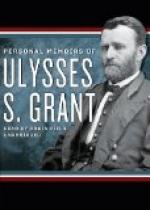At West Point I had a class-mate—in the last year of our studies he was room-mate also—F. T. Dent, whose family resided some five miles west of Jefferson Barracks. Two of his unmarried brothers were living at home at that time, and as I had taken with me from Ohio, my horse, saddle and bridle, I soon found my way out to White Haven, the name of the Dent estate. As I found the family congenial my visits became frequent. There were at home, besides the young men, two daughters, one a school miss of fifteen, the other a girl of eight or nine. There was still an older daughter of seventeen, who had been spending several years at boarding-school in St. Louis, but who, though through school, had not yet returned home. She was spending the winter in the city with connections, the family of Colonel John O’Fallon, well known in St. Louis. In February she returned to her country home. After that I do not know but my visits became more frequent; they certainly did become more enjoyable. We would often take walks, or go on horseback to visit the neighbors, until I became quite well acquainted in that vicinity. Sometimes one of the brothers would accompany us, sometimes one of the younger sisters. If the 4th infantry had remained at Jefferson Barracks it is possible, even probable, that this life might have continued for some years without my finding out that there was anything serious the matter with me; but in the following May a circumstance occurred which developed my sentiment so palpably that there was no mistaking it.
The annexation of Texas was at this time the subject of violent discussion in Congress, in the press, and by individuals. The administration of President Tyler, then in power, was making the most strenuous efforts to effect the annexation, which was, indeed, the great and absorbing question of the day. During these discussions the greater part of the single rifle regiment in the army—the 2d dragoons, which had been dismounted a year or two before, and designated “Dismounted Rifles”—was stationed at Fort Jessup, Louisiana, some twenty-five miles east of the Texas line, to observe the frontier. About the 1st of May the 3d infantry was ordered




